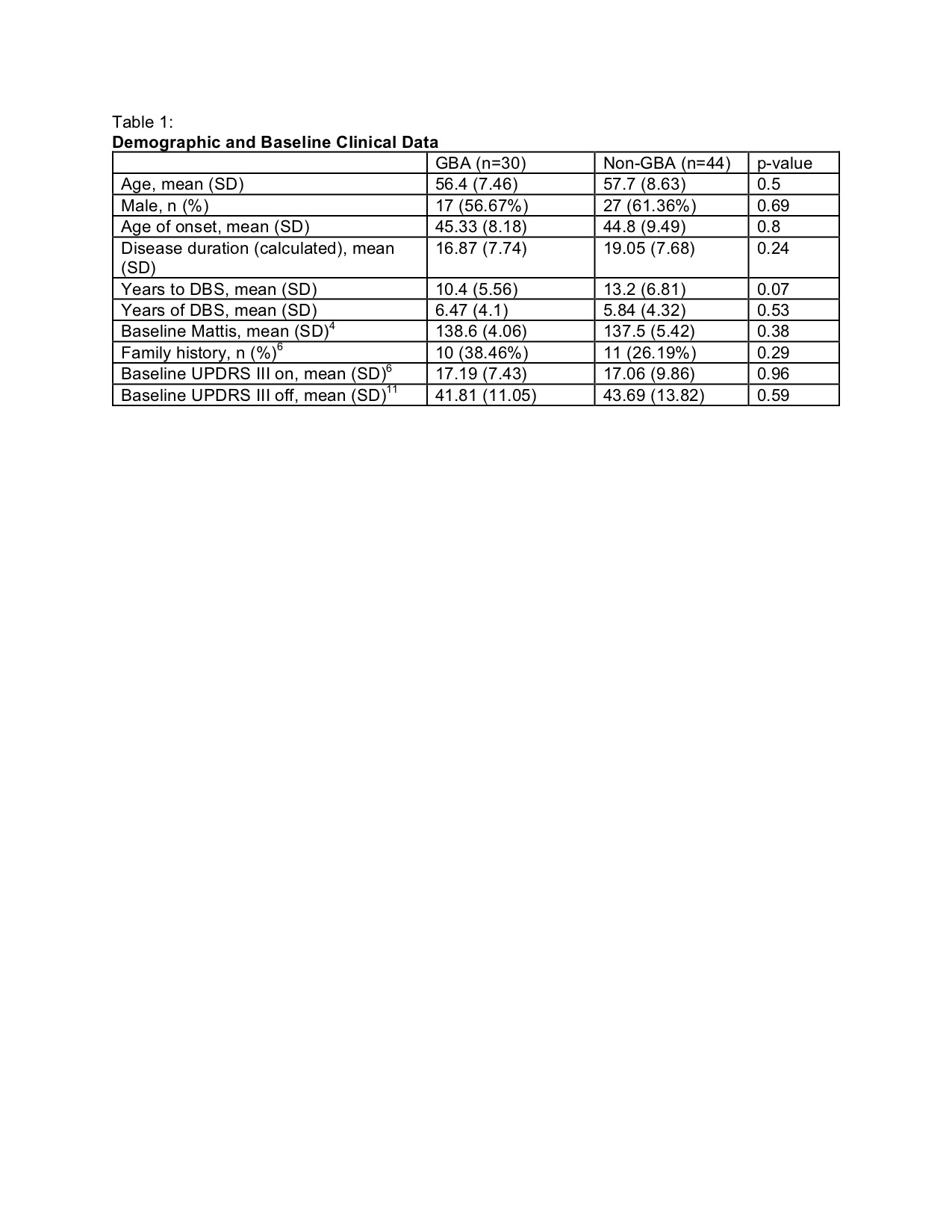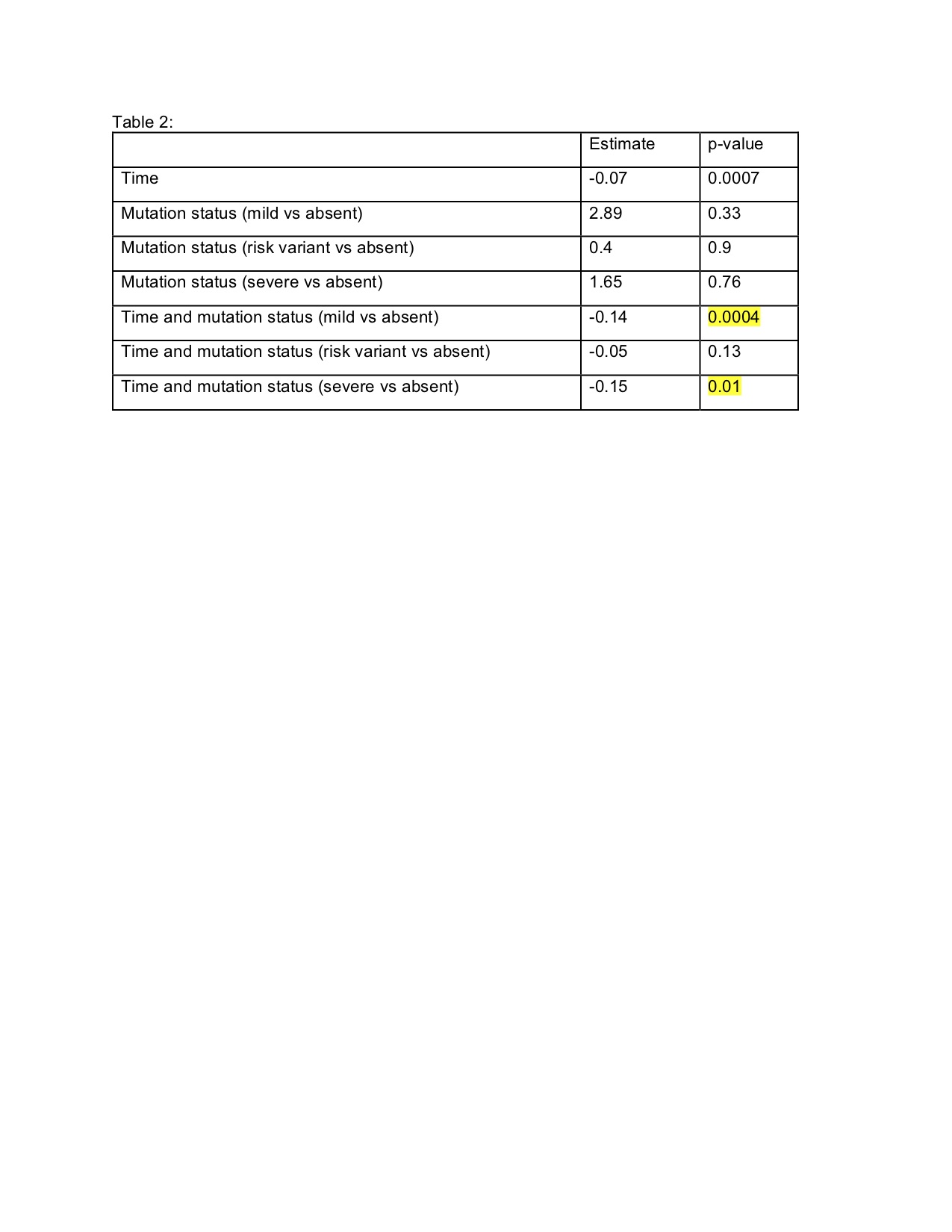Session Information
Date: Wednesday, September 25, 2019
Session Title: Surgical Therapy
Session Time: 1:15pm-2:45pm
Location: Les Muses Terrace, Level 3
Objective: To determine the rate of cognitive decline in glucocerebrosidase (GBA) mutation carriers with subthalamic nucleus deep brain stimulation (STN-DBS).
Background: About 12-17% of Parkinson’s disease (PD) subjects undergoing DBS carry mutations in the GBA gene. The rate of cognitive decline in GBA mutation carriers after DBS has never been examined in a large cohort.
Method: PD subjects with bilateral STN-DBS and GBA genotyping were identified from Rush University Medical Center, University College London Institute of Neurology, Norwegian University of Science and Technology, Icahn School of Medicine at Mount Sinai, Columbia University, and Parkinson’s Progression Markers Initiative (PPMI). Data collected included age, age of onset, sex, years before DBS, years since DBS, family history, UPDRS, MMSE, MoCA, and Mattis Dementia Rating Scale (MDRS). MMSE and MoCA scores were converted to MDRS scores(1). Subjects were required to have a baseline MDRS score >=130 to be included in the analysis. Subjects were fully sequenced for GBA mutations and categorized into 4 groups: risk variants, mild, severe, or non-mutation carriers. Linear mixed modeling was used to compare rate of change in MDRS scores over time comparing the four groups, adjusting for age, sex, years before DBS, and years since DBS.
Results: Data were available for 30 GBA mutation carriers and 44 non-mutation carriers. GBA mutation carriers included 11 subjects with risk variants, 15 subjects with mild mutations, and 4 subjects with severe mutations. There was no significant difference in age, sex, age of onset, years before DBS, years since DBS, baseline MDRS scores, family history, or baseline UDPRS-III (OFF/ON) scores between the two groups (Table 1). MDRS scores worsened over time in all 4 groups (-0.84 points per year, p = 0.0007). MDRS scores decreased faster in mild GBA mutation carriers (-1.68 points per year p = 0.0004) and severe GBA mutation carriers (-1.8 points per year, p = 0.01) compared with non-mutation carriers (Table 2). Median follow-up time was 5.5 years and was not significantly different between the groups (p = 0.68).
Conclusion: PD subjects with mild or severe GBA mutations with STN-DBS have faster cognitive decline compared with non-mutation carriers. This is the largest cohort to date to examine cognitive decline in GBA mutation carriers after STN-DBS. Additional studies are needed to compare cognitive decline after STN vs. globus pallidus interna (GPi) DBS.
References: 1. van Steenoven I, Aarsland D, Hurtig H, Chen-Plotkin A, Duda JE, Rick J, Chahine LM, Dahodwala N, Trojanowski JQ, Roalf DR, Moberg PJ, Weintraub D. Conversion between mini-mental state examination, montreal cognitive assessment, and dementia rating scale-2 scores in Parkinson’s disease. Mov Disord. 2014 Dec;29(14):1809-15.
To cite this abstract in AMA style:
G. Pal, E. Hill, T. Foltynie, V. Lythe, R. Alcalay, P. Garcia, K. Marder, R. Saunders-Pullman, S. Bressman, J. Aasly, B. Ouyang, Y. Liu, S. Anderson, B. Bernard, L. Verhagen. Cognitive outcomes of STN-DBS in GBA mutation carriers with PD [abstract]. Mov Disord. 2019; 34 (suppl 2). https://www.mdsabstracts.org/abstract/cognitive-outcomes-of-stn-dbs-in-gba-mutation-carriers-with-pd/. Accessed July 14, 2025.« Back to 2019 International Congress
MDS Abstracts - https://www.mdsabstracts.org/abstract/cognitive-outcomes-of-stn-dbs-in-gba-mutation-carriers-with-pd/


